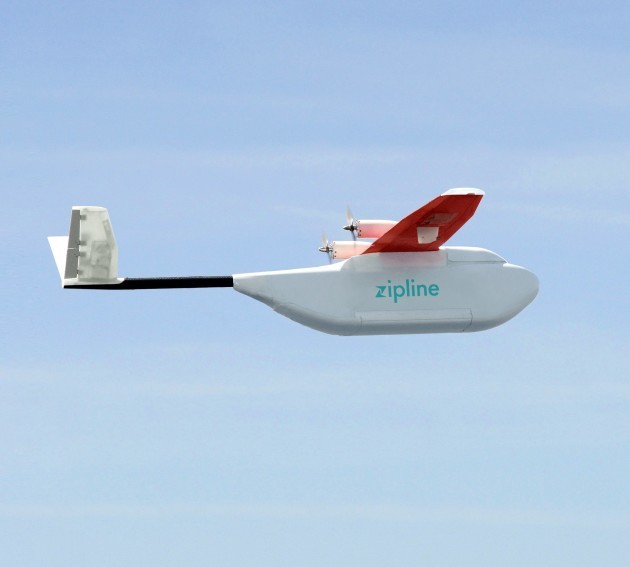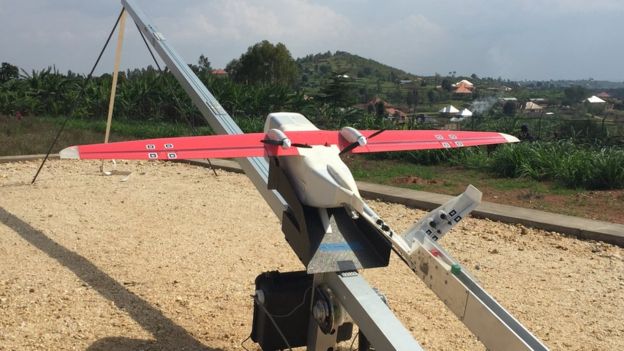Zipline International is a California based start-up that makes delivery drones to help people of African villages, by delivering blood and important medical supplies in association with Rwandan government.

The Problem:
It’s been told than more than 2 billion people in the world lack access to proper health care due to non-availability of sophisticated hospitals and infrastructure gaps. Also this leads to death of more than 2.9 children every year who are of age less than 5 years. Also it is estimated that more than 150,000 mothers die during pregnancy due to lack of blood at the time of surgery. All these issues can be tackled through various ways and making medical products accessible to the people at correct time. Zipline is one such start-up which was launched in 2014 with an aim to develop advanced humanitarian delivery drones that can drop medical supplies in the remote African villages and places lacking necessary infrastructure.
How it works?
In order to place an order with Zipline for delivery of medical supplies, a text message is sent by the healthcare provider. Then immediately the supplies are placed in the Zip drone and it gets launched in air at a speed of 100 kilometres per hour. Zip is completely automatic drone that can fly without a pilot and reaches the exact destination automatically with help of GPS. The medical supplies are dropped off at exact location in an open space near the healthcare facility along with a parachute so that it reaches the ground safely. Zipline has been following this simple procedure to help the people of Rwanda in tie up with the government. The zips do not land when dropping off the medical supplies, but they just hover over the open space and drop the supplies in a small box along with the chute from about forty feet in air.
Technology:
Zips are fixed-wing drones which makes them unique when compared to the usual multi-rotor or quadcopter designs. The fixed-wing design makes it easier for the Zips to fly longer distances with less power and also to fly reliably in variable weather conditions. Instead of using cameras or depth-sensors, the Zips make use RTK GPS which is a more precise and advanced GPS technology that helps them to precisely target the location where they should make the drop. The zips are electric powered and can carry maximum of 3 pounds of medical supplies and for a single charge can fly maximum distance of 75 miles. On-board refrigeration is not requires since the Zip reach their destination within 30 minutes. The whereabouts of each zip is tracked through a back-end system which also keeps track of the supplies carried by each zip. The drones are also aware of the position of each other and can automatically route themselves. The Zips weigh around 14 kilograms when fully loaded and could fly at different speeds to reach the destination within 30 minutes.

Founders and Team:
Keller Rinaudo is the founder and CEO of Zipline who is passionate about providing services to the rural people with help of technology. Keenan Wyrobek is the CTO and co-founder of the company who expects each Zip to take at least 1,500 flights before replacing their batteries. They currently have a 40-employee team with most of them in US and few based in Rwanda and are growing steadily.
Zipline received its initial funding and financial support from Google Ventures and various venture capital firms like Sequoia partners. Even Paul-Allen, the co-founder of Microsoft has also made significant contributions for their funding. They have raised significant grants from the government and various VCs to help them with development of their planes and software to manage the fleet.
Expanding in other regions:
The company currently flies about 30 drones in Rwanda and has setup their landing rigs and launchers close the medical supply warehouses in Rwanda. They are also launching a similar program in US to help the rural communities of Washington, Nevada and Maryland. They also conducted a White House Workshop on UAV (Unpiloted Aerial Vehicles) in August. Zipline aims to operate 20 distribution centres by end of 2017 and will continue to expand its services in other countries.

